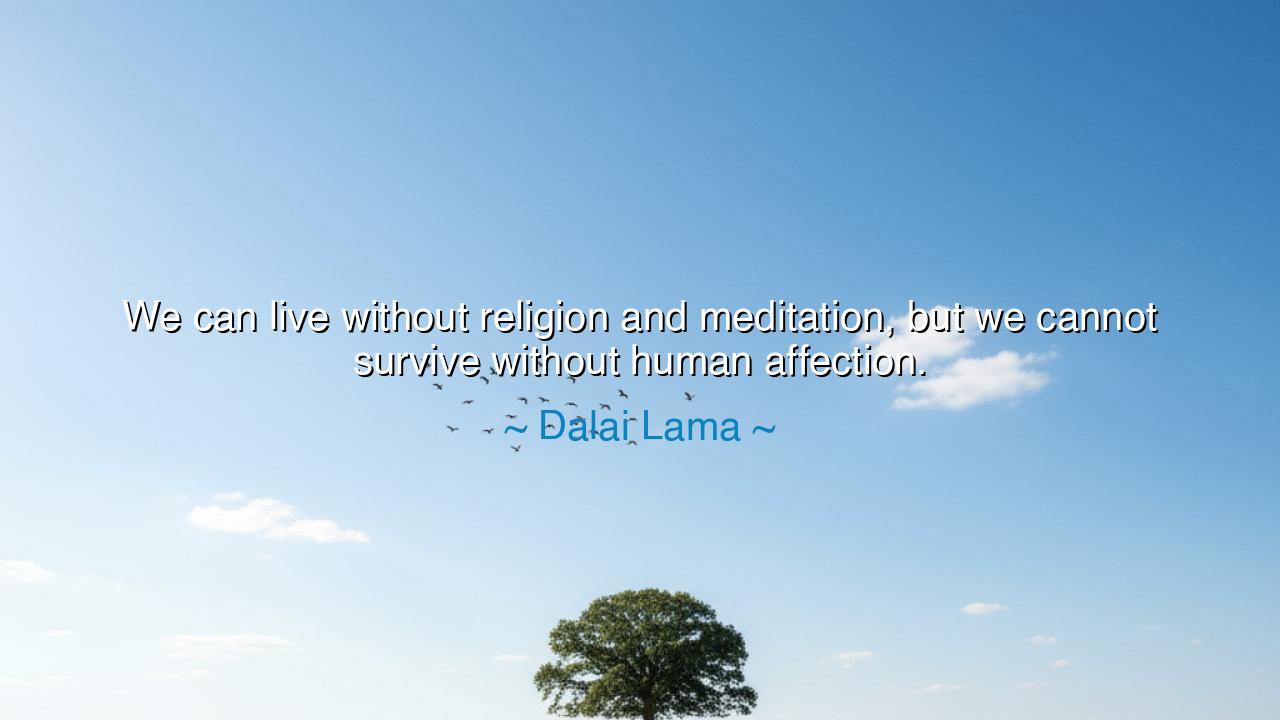
We can live without religion and meditation, but we cannot
We can live without religion and meditation, but we cannot survive without human affection.






In the journey of life, there is an enduring truth that transcends the barriers of culture, time, and circumstance. The great Dalai Lama speaks to this truth with profound clarity when he declares, "We can live without religion and meditation, but we cannot survive without human affection." His words cut to the very core of human existence, reminding us that while religion and meditation may guide our paths and give us solace, it is human affection—the love and connection we share with others—that sustains us through life’s trials and triumphs.
The ancients understood this truth well. Aristotle, in his Nicomachean Ethics, taught that humans are naturally social creatures. To live a fulfilling life, one must not only seek wisdom and virtue but also engage in meaningful relationships with others. Aristotle called this the "good life," a life enriched by friendship, mutual care, and community. Even the most solitary philosopher, though he may withdraw to contemplate the nature of the universe, must acknowledge the deep and intrinsic need for human connection. For without these bonds, we are nothing more than isolated beings adrift in a vast, indifferent world.
Consider the life of Helen Keller, a woman who was both deaf and blind from a young age. Despite these profound physical limitations, it was the human affection of her teacher, Anne Sullivan, that allowed her to overcome the barriers of her circumstances. Sullivan did not simply teach Keller language and communication, but she shared a bond of deep affection, patience, and understanding. This connection gave Keller the strength to not only survive but thrive. Her story demonstrates that, even in the face of overwhelming adversity, it is the love and care we receive from others that enables us to rise above our limitations.
Similarly, the life of Mahatma Gandhi stands as a testament to the power of human affection in shaping the course of history. Gandhi spent many years in pursuit of justice, truth, and freedom. But what propelled him was not just a political ideology or the strength of his meditations, but the affection he felt for the people he fought for, and the love he had for his fellow human beings. His philosophy of non-violence was rooted not in detachment from human emotion, but in a profound respect for the intrinsic worth of every human life. Gandhi understood that to truly change the world, one must first have a deep affection for those whose suffering we seek to alleviate. It was human affection—the compassion and care for others—that sustained him through the darkest days of his struggle.
The Dalai Lama, too, embodies this truth in his own life. As a spiritual leader, he has spent his life teaching the importance of compassion, not just as a religious practice, but as a fundamental element of being human. He teaches that true peace cannot be achieved through doctrine or solitary practice alone, but through the cultivation of deep, genuine affection for others. Human affection, he reminds us, is the source of both individual happiness and collective harmony. It is in the bonds of love, friendship, and compassion that we find the strength to face life's most difficult challenges.
The lesson here is clear: while we may live without religion or the discipline of meditation, we cannot survive without human affection. The material world may offer us knowledge, wealth, or status, but it is affection that gives our lives meaning. Whether it comes from family, friends, or community, it is the love and care we give and receive that nourishes our spirits. The Dalai Lama teaches us that we are not isolated beings trying to navigate the world alone, but part of a great web of human connection. It is this connection, this shared affection, that carries us through life’s most difficult moments.
In our own lives, we must ask ourselves: how often do we prioritize the affection of others over our own individual pursuits? Do we foster connections with those around us, or do we retreat into the solitary pursuits of wealth, status, or intellect? The Dalai Lama’s words remind us that the path to a fulfilling life is not found in isolation or detachment but in the deep and meaningful bonds we create with others. Let us seek to build these bonds, to cultivate affection, and to offer love to those around us. For it is through these relationships that we find our greatest strength, our deepest purpose, and our truest happiness.






AAdministratorAdministrator
Welcome, honored guests. Please leave a comment, we will respond soon